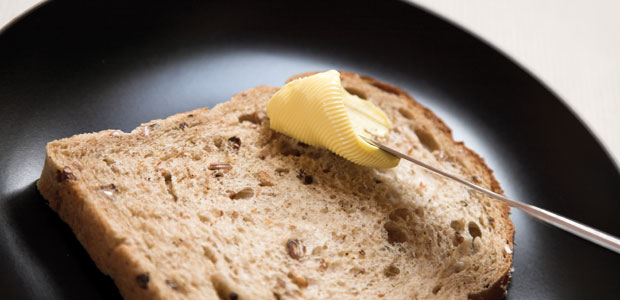Advertisement
Is Butter Better?
Or is margarine healthier?

Butter may be a natural whole food that provides vitamins E and A as well as the fats our bodies require to synthesize these vitamins. But butter is high in saturated fats that have been linked with inflammation, obesity, and type 2 diabetes. So, is margarine the better choice?
Margarine provides fewer calories than salted butter, contains no cholesterol, and is lower in sodium and saturated fats. To its further advantage, margarine is made from vegetable oils instead of animal fats.
Margarine Contains Trans Fat
On the downside for margarine is the trans fats they contain, produced during the hydrogenation process to change vegetable oil from liquid to solid. Trans fats lower the amount of high-density lipoproteins (the good ones) that sweep cholesterol out of our bloodstream.
At the same time trans fats increase the number of low-density lipoproteins (the bad ones) that keep excess cholesterol in circulation. The presence of trans fats in the body has been linked to increased risk of heart disease.
Butter May Contain Environmental Toxins
Butter, on the other hand, is not as healthy a fat as it was 50 years ago when antibiotics and chemical fertilizers were less prevalent and factory farming was less of an issue.
The water a cow drinks, the chemically treated grain-based feed it eats, and the medicines it takes are all factors that contribute toxins to butter. Choosing organic butter can help get around these problems.
Nevertheless, it makes sense to avoid trans fats. For cooking, the monounsaturated fats in olive oil offer a healthy alternative to butter’s saturated fats. For baking, butter has no substitute in terms of flavour and predictability of the recipe’s outcome.
Butter is still the better choice, especially because it contains short- and medium-chain fats such as butyric and myristic acids, both of which have proven health benefits.
The main thing is to keep total fat intake between 25 and 35 percent of daily calories, as recommended by the Canadian Heart and Stroke Foundation.
Nutritional Comparison
| 1 tsp (5 mL) of | Unsalted butter | Blue Bonnet soft-tub margarine |
| Total Fat | 3.8 g | 5.5 g |
| Saturated Fat | 2.4 g | 1 g |
| Cholesterol | 10 mg | 0 mg |
| Calories | 34 | 30 |
| Sodium | 0.6 mg | 30 mg |
The Ongoing Debate
Nonhydrogenated margarines labelled as “trans-fat free” can legally contain up to 0.2 percent trans fats. Butter can also contain small amounts of naturally occurring trans fats.




